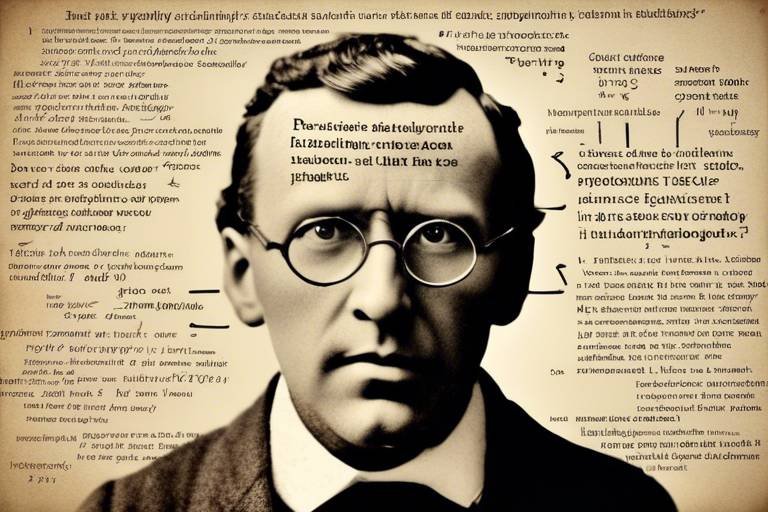Unmasking the Philosophies of Cults
Cults often evoke a mix of fascination and fear, don’t they? The term "cult" itself can conjure images of secretive gatherings, charismatic leaders, and a fervent devotion that seems almost irrational. But what exactly drives these groups? What philosophies lie beneath their surface? In this exploration, we will peel back the layers of cults to reveal the intricate belief systems, recruitment strategies, and psychological impacts that define them. Understanding these elements not only sheds light on the inner workings of cults but also highlights their broader implications on society as a whole.
To truly grasp the philosophies of cults, we first need to understand what sets them apart from other religious or social groups. Cults typically exhibit distinct characteristics that differentiate them from mainstream organizations. They often have a charismatic leader who claims to possess special knowledge or insight, creating a hierarchical structure where followers are expected to submit to authority. This dynamic fosters an environment where critical thinking is discouraged, and loyalty is paramount. Moreover, cults frequently promote an “us vs. them” mentality, which can lead to isolation from the outside world and reinforce the belief that their group holds the ultimate truth.
But why do people gravitate towards these groups? The answer lies in the psychological manipulation employed by cults. These organizations often target vulnerable individuals who are seeking purpose or belonging. Through various tactics, they create a sense of community and identity that can be hard to resist. Consider how they might exploit emotional vulnerabilities, offering solace in times of distress. This emotional appeal can be incredibly powerful, making individuals feel as though they have found a family or a higher calling.
As we delve deeper into the philosophies of cults, it becomes evident that their belief systems are often built on a foundation of fear and dependency. Members are led to believe that they are part of an exclusive group destined for greatness or enlightenment, while the outside world is portrayed as dangerous or corrupt. This dichotomy not only strengthens their commitment to the cult but also makes it increasingly difficult for them to leave. The psychological impacts of such beliefs can be profound, leading to long-term emotional and mental health challenges for former members.
In the following sections, we will explore the recruitment strategies that cults employ to attract new members, the consequences of membership, and the cultural representations of cults in popular media. By understanding these elements, we can better comprehend the complexities of cults and their philosophies, ultimately fostering a more informed perspective on these enigmatic groups.
- What defines a cult? Cults are typically characterized by a charismatic leader, a closed belief system, and a strong sense of community that often isolates members from the outside world.
- How do cults recruit new members? Cults often target vulnerable individuals, using emotional appeals and creating a sense of belonging to attract new members.
- What are the psychological impacts of being in a cult? Membership in a cult can lead to dependency, fear, and long-term emotional challenges, making it difficult for individuals to reintegrate into society.
- Are there resources for cult recovery? Yes, there are various support systems and professional help available for individuals recovering from cult experiences.

[Defining Cults]
Understanding what constitutes a cult is essential for anyone looking to navigate the complex world of religious and social organizations. At first glance, the term "cult" might evoke images of dark rituals and brainwashed followers, but the reality is much more nuanced. Cults are generally characterized by their unique belief systems, which often diverge significantly from mainstream ideologies. These belief systems can include unconventional views on spirituality, morality, and the nature of existence, creating a framework that is both alluring and isolating.
One of the defining features that sets cults apart from other groups is their organizational structure. Cults often operate under a strict hierarchy, with a charismatic leader or a small group of leaders at the top. This structure fosters a sense of dependency among members, who may feel they need guidance and direction from those in power. The leader's authority is often seen as unquestionable, creating an environment where dissent is not tolerated. This dynamic can lead to a profound sense of belonging for members, but it can also result in significant psychological manipulation.
Additionally, cults frequently employ exclusive practices that separate them from the outside world. They may discourage or outright prohibit interactions with non-members, reinforcing the idea that outsiders are a threat to their beliefs. This isolation can create a bubble where the cult's teachings go unchallenged, making it difficult for members to see the broader context of their situation. In essence, cults create their own reality, one that is often filled with fear and loyalty.
To better understand the defining characteristics of cults, consider the following table that contrasts cults with mainstream religious organizations:
| Aspect | Cults | Mainstream Religions |
|---|---|---|
| Leadership | Authoritarian, often a single leader | Democratic or hierarchical, with shared leadership |
| Belief System | Unconventional, often secretive | Established, with historical texts |
| Member Interaction | Isolation from outsiders | Encouraged engagement with the community |
| Emotional Manipulation | High levels of psychological control | Focus on personal growth and community support |
In summary, cults are more than just fringe groups; they represent a complex interplay of belief, manipulation, and social dynamics. Recognizing the distinctive features of cults can empower individuals to make informed decisions about their affiliations and to understand the potential risks involved in joining such organizations. As we delve deeper into the philosophies that drive cults, it becomes clear that their impact extends beyond individual lives, affecting families and communities at large.

[Psychological Manipulation]
The world of cults is often shrouded in mystery and intrigue, but one of the most alarming aspects is their use of psychological manipulation to control and influence their members. This manipulation is not merely a tactic; it is a fundamental strategy that underpins the very existence of these groups. Cult leaders are adept at exploiting human psychology, creating an environment where dependency, fear, and loyalty flourish. Imagine being in a web where every strand is meticulously woven to keep you entrapped, where your thoughts, feelings, and even your reality are dictated by someone else. This is the reality for many cult members.
One of the primary techniques used in psychological manipulation is the fostering of dependency. Cults often create a scenario where members feel they cannot survive outside the group. This can be achieved through various means, such as limiting access to outside information or social support. When individuals are isolated from their friends and family, they become increasingly reliant on the cult for emotional and psychological support. This dependency is further reinforced through a cycle of love-bombing and withdrawal, where members are showered with affection and attention, only to experience emotional neglect once they are fully committed. It’s like being on a rollercoaster of emotions, where the highs are exhilarating but the lows can be devastating.
Another critical component of psychological manipulation is the use of fear. Cults often instill a sense of dread about the outside world. Members are frequently told that leaving the group will lead to dire consequences, such as spiritual damnation or even physical harm. This fear can be paralyzing, creating a mental prison that keeps individuals from questioning their beliefs or considering the possibility of life outside the cult. The psychological toll of living in such an environment can be immense, leading to anxiety, depression, and a host of other mental health issues.
Moreover, cults employ a variety of loyalty techniques to ensure that members remain committed to the group. These can include:
- Public Confessions: Members may be encouraged to confess their sins or doubts publicly, reinforcing their commitment to the group and creating a sense of shame that ties them to the cult.
- Group Activities: Engaging in intense group activities, such as retreats or workshops, can create a sense of bonding and shared purpose, making it harder for individuals to leave.
- Reward Systems: Cults often have systems in place to reward loyalty, such as praise, special roles, or privileges, which can further entrench members in their beliefs.
In conclusion, the psychological manipulation employed by cults is a complex and multifaceted issue that goes beyond mere brainwashing. It involves a sophisticated understanding of human psychology and emotions, creating an environment where individuals feel trapped and unable to escape. Understanding these manipulative tactics is crucial not only for those who find themselves in such situations but also for society at large. By recognizing the signs of psychological manipulation, we can better protect ourselves and others from the insidious nature of cults.
- What are some signs that someone might be involved in a cult? Look for changes in behavior, isolation from friends and family, and an unusual emphasis on group activities.
- How can someone safely leave a cult? It's important to have a support system in place, whether through friends, family, or professional help, to navigate the transition.
- Are all cults religious in nature? No, cults can be based on a variety of ideologies, including political, social, or even commercial beliefs.

[Recruitment Strategies]
When it comes to cults, the recruitment process is nothing short of an art form. Imagine a spider weaving its web, meticulously crafting a trap that is both alluring and inescapable. Cults employ a variety of strategies designed to draw in individuals, particularly those who are vulnerable or searching for something more in their lives. This isn’t just about convincing someone to join; it’s about creating a deep-seated need for belonging and purpose.
One of the primary tactics used by cults is to target vulnerable individuals. These might be people going through tough times—like a breakup, loss of a job, or even existential crises. Cults often set up shop in places where these individuals congregate, such as community centers, social media platforms, or even during public events. They present themselves as a source of comfort and understanding, offering solutions to life's complex challenges.
Another significant aspect of their recruitment strategy is the creation of a sense of belonging. Once a potential recruit is identified, cults often employ a technique called 'love bombing.' This involves overwhelming the individual with attention and affection, making them feel special and valued. It’s almost like being swept off your feet in a whirlwind romance. However, this initial euphoria can quickly turn into a dependency, as the individual begins to crave the validation and approval from the group.
Moreover, cults are adept at using emotional appeals to strengthen their grip on new members. They might share stories of personal transformation, showcasing how joining the group has changed lives for the better. This narrative can be incredibly persuasive, as it taps into the innate human desire for improvement and fulfillment. Once an emotional connection is established, it becomes increasingly difficult for individuals to question the group's motives or practices.
Social isolation is another strategy that cults use to fortify their ranks. After recruitment, members are often encouraged to cut ties with their friends and family. This can be done subtly, through the suggestion that non-members do not understand the group's values or beliefs. By isolating individuals from their support systems, cults can create an environment where loyalty to the group becomes paramount, and any dissent is quickly silenced.
In summary, the recruitment strategies of cults are a complex interplay of psychological manipulation, emotional connection, and social isolation. They create a web of dependency that can be incredibly difficult to escape. Understanding these tactics is crucial for recognizing the signs of cult influence and protecting oneself from falling into their traps.
- What are the signs of a cult? Cults often exhibit a strong leader, isolation from outside influences, and a focus on recruitment.
- How can someone leave a cult? Leaving a cult often requires a strong support system, professional counseling, and sometimes, legal assistance.
- Are all cults religious? No, cults can be religious, political, or social in nature, all using similar tactics to recruit and retain members.

[Social Isolation]
Social isolation is one of the most insidious tactics employed by cults to maintain control over their members. By cutting individuals off from their outside support systems—friends, family, and even colleagues—cults create an environment where dependency on the group becomes not just common but necessary. Imagine being in a bubble where the only voices you hear are those echoing the beliefs of the cult. This bubble can feel safe and comforting, but it also stifles any dissenting thoughts and reinforces the cult's ideology.
Members often find themselves in a situation where they are not just isolated physically, but emotionally as well. When a person is distanced from their loved ones, they may begin to feel a sense of loss or confusion. The cult steps in to fill that void, offering a new family, a new sense of belonging. This is where the manipulation deepens; the cult often portrays the outside world as dangerous, filled with 'non-believers' who seek to undermine the truth. In this context, loyalty to the group becomes a shield against the perceived threats outside.
To illustrate this point, consider the following table that outlines the common methods of social isolation used by cults:
| Method | Description |
|---|---|
| Physical Separation | Members are often relocated to secluded areas, away from their previous lives. |
| Limiting Communication | Restrictions on phone calls, emails, and visits from outsiders. |
| Negative Framing | Portraying family and friends as antagonistic to the member's well-being. |
| Group Activities | Encouraging participation in group-only events that exclude outside interactions. |
This isolation can lead to a profound psychological impact. Members may start to question their own realities, believing that the cult is the only source of truth and support. This manipulation of reality can be so strong that individuals may even sever ties with their families voluntarily, convinced that their new group is the only place where they truly belong. Such actions can leave lasting scars, making it difficult for former members to reconnect with their past lives even after they leave the cult.
In summary, social isolation is a powerful tool that cults use to foster loyalty and commitment among their members. By creating an environment where the outside world is viewed as hostile and the group as a sanctuary, they successfully strip away individual autonomy, making it incredibly challenging for members to break free from their grasp.
- What are the signs that someone might be in a cult? Look for signs of extreme loyalty to a group, isolation from friends and family, and a shift in personal beliefs or values.
- How can someone help a friend who may be involved in a cult? Approach them with empathy, express your concerns without judgment, and encourage open communication.
- Are all cults religious in nature? No, cults can be based on various ideologies, including political, social, or self-help philosophies.
- What should I do if I suspect a loved one is being manipulated by a cult? Seek professional advice, and consider contacting organizations that specialize in cult recovery for guidance.

[Emotional Appeals]
Emotional appeals are the lifeblood of cult recruitment strategies, acting as a potent magnet that draws individuals into the fold. Imagine walking into a room filled with people who seem to understand you completely, who validate your feelings, and who offer you a sense of belonging that you might have never experienced before. This is the allure of cults—they tap into the deepest emotional needs of individuals, creating bonds that can feel unbreakable.
At the core of these emotional appeals is the promise of **unconditional love** and acceptance. Cult leaders often position themselves as saviors, offering a vision of a better life that resonates with the fears and desires of their targets. They know how to play on insecurities, using phrases that evoke strong feelings and create a sense of urgency. For instance, they might say things like, “You are special, and you have a purpose that the world doesn’t recognize.” This kind of messaging can be incredibly persuasive, especially for those feeling lost or marginalized.
Moreover, cults frequently employ **storytelling** as a powerful tool to evoke emotions. Through personal testimonies and shared experiences, members recount their journeys from despair to enlightenment, often framing their transformation in dramatic terms. These narratives not only captivate new recruits but also reinforce the idea that the cult is a sanctuary for the broken and the lost. The emotional weight of these stories can be overwhelming, creating a compelling reason for individuals to join and remain committed to the group.
Another tactic involves using **rituals and ceremonies** that heighten emotional experiences. Think of a wedding or a graduation ceremony—these events are designed to evoke strong feelings of joy, connection, and purpose. Cults replicate this by creating their own rituals that foster a sense of community and shared identity among members. These gatherings often include music, chanting, and other activities that can induce feelings of euphoria, making participants more susceptible to the group’s influence.
Furthermore, cults often utilize **guilt and fear** as emotional tools. By instilling a sense of obligation to the group or portraying the outside world as dangerous and untrustworthy, they can manipulate members into staying loyal. For example, phrases like, “If you leave us, you will be lost forever,” can create a paralyzing fear of abandonment, making it difficult for individuals to consider life outside the cult. This emotional manipulation is insidious, as it can lead to a cycle of dependency that is hard to break.
To illustrate how emotional appeals work in cults, consider the following table that outlines various emotional strategies employed:
| Emotional Strategy | Description |
|---|---|
| Unconditional Love | Cults promise acceptance and belonging, often making members feel valued and understood. |
| Storytelling | Personal testimonies create emotional connections and illustrate the transformative power of the group. |
| Rituals | Ceremonies foster community and shared identity, enhancing emotional bonds among members. |
| Guilt and Fear | Instilling fear of abandonment and portraying the outside world as dangerous to maintain loyalty. |
In conclusion, emotional appeals are not just a recruitment strategy; they are a fundamental aspect of how cults operate. By understanding these tactics, individuals can better recognize the signs of emotional manipulation and protect themselves from falling prey to such organizations. The emotional landscape cultivated by cults is complex and deeply impactful, making it crucial for society to remain vigilant and informed.
- What are the signs of emotional manipulation in cults? Look for patterns of dependency, guilt, and fear used to control members.
- How do cults create a sense of belonging? They often use emotional appeals, rituals, and shared narratives to foster community.
- Can someone recover from a cult experience? Yes, recovery is possible with support systems and professional help.

[Belief Systems]
Cults often thrive on distinctive belief systems that not only set them apart but also bind their members together in a shared identity. These belief systems are usually characterized by a unique interpretation of spirituality, morality, and the outside world. For many cults, the fundamental tenets are often seen as absolute truths, creating a strong dichotomy between the cult's worldview and that of mainstream society. This can lead to a sense of superiority among members, who may believe they possess exclusive knowledge or insight that others lack.
One common theme in cult belief systems is the idea of an impending apocalypse or significant transformation. Members may be convinced that they are the chosen few who will survive a catastrophic event or that they have a crucial role in ushering in a new era. This belief not only fosters a sense of urgency but also strengthens loyalty to the group as members feel they are part of something monumental. The psychological impact of such beliefs can be profound, often leading to an intense commitment that overshadows personal doubts or external criticisms.
Another critical aspect of cult belief systems is their approach to morality. Cults often redefine what is considered right and wrong, creating a moral framework that is exclusive to their community. This can manifest in various ways, such as the demonization of outsiders or the justification of unethical behaviors in the name of the group's goals. Members are frequently taught that loyalty to the group supersedes all other moral obligations, including those to family and friends. This can lead to a profound internal conflict for individuals when they begin to question the morality of their actions or the teachings they have embraced.
Moreover, cults typically promote a strong us vs. them mentality, which serves to isolate members from external influences. This separation from the outside world is often justified through teachings that portray society as corrupt, dangerous, or misguided. By instilling fear and distrust towards non-members, cults reinforce their belief systems and maintain control over their followers. The more isolated members become, the more they rely on the cult for emotional support, validation, and a sense of purpose.
In summary, the belief systems of cults are intricately designed to foster dependency and loyalty among members. They create a reality where the cult’s teachings are seen as the only path to truth and salvation. Understanding these belief systems is crucial for recognizing how cults manipulate their followers and the broader implications for society. As we delve deeper into the consequences of membership in cults, it becomes clear that these beliefs have far-reaching effects on individuals and their relationships with the world around them.
- What defines a cult? Cults are typically defined by their unique belief systems, charismatic leaders, and practices that set them apart from mainstream religious or social groups.
- How do cults recruit members? Cults often target vulnerable individuals, using emotional appeals and creating a sense of belonging to draw them in.
- What are the psychological impacts of cult membership? Members may experience profound changes in behavior, emotional dependency, and challenges in reintegrating into society after leaving.
- Can former cult members recover? Yes, recovery is possible through support systems and professional help that address the unique challenges faced by ex-members.

[Consequences of Membership]
Being part of a cult can lead to a myriad of serious consequences that extend far beyond the immediate environment of the group. Members often find themselves entangled in a web of psychological, social, and financial challenges that can linger long after they leave. The impact on mental health is particularly profound, as individuals may experience symptoms of anxiety, depression, and even post-traumatic stress disorder (PTSD). Imagine stepping out of a dark cave into the blinding light of day; the transition can be disorienting and overwhelming. This is often how ex-members describe their feelings when they finally escape the confines of a cult.
Socially, the consequences can be equally daunting. Many cults enforce strict rules about relationships with outsiders, leading to a breakdown of family ties and friendships. When a member decides to leave, they often find themselves isolated, lacking the support networks that are crucial for recovery. The emotional toll can be devastating, as leaving a cult is not just about walking away from a group; it's about severing connections that might have been built over years. This isolation can lead to feelings of loneliness and abandonment, creating a vicious cycle that makes reintegration into society even more challenging.
Financially, membership in a cult can be a drain on resources. Many cults require members to donate significant portions of their income, sometimes even their life savings, to the organization. This can leave individuals in precarious financial situations when they decide to leave. They may find themselves with mounting debts and little to no savings, which complicates their ability to rebuild their lives. The financial exploitation is often masked by promises of spiritual enlightenment or community support, making it all the more insidious.
Furthermore, the psychological manipulation experienced within cults can lead to a distorted sense of reality. Members may struggle to trust their own judgment, making it difficult to navigate the outside world after leaving. They might question their beliefs, values, and even their identity. This identity crisis can be likened to a ship lost at sea, desperately searching for land but unsure of where to go. The journey to reclaiming a sense of self is often long and fraught with challenges.
In summary, the consequences of cult membership are multifaceted and can affect individuals in profound ways. From mental health struggles to social isolation and financial ruin, the aftermath of being part of a cult is not something to be taken lightly. It requires resilience, support, and often professional help to navigate the complexities of recovery.
- What are the psychological effects of leaving a cult? Many ex-members experience anxiety, depression, and PTSD due to the manipulative tactics used within cults.
- How can I support someone who has left a cult? Providing emotional support, encouraging professional help, and being patient as they navigate their recovery can be immensely helpful.
- Are there resources available for cult survivors? Yes, there are numerous organizations and support groups dedicated to helping individuals recover from cult experiences.

[Post-Cult Recovery]
Recovering from a cult experience is not just about leaving; it's about rebuilding a life that may have been profoundly altered. Imagine stepping out of a dark tunnel into the blinding light of day after years of being in the shadows. It's exhilarating yet overwhelming. Many individuals find themselves grappling with identity crises, emotional scars, and a sense of disconnection from the world around them. The journey to reclaiming one's life can be both daunting and liberating.
One of the first steps in post-cult recovery is acknowledging the trauma experienced during membership. This can involve a range of feelings from guilt to anger, and even confusion about what is real and what was manipulated. It's essential for individuals to engage in self-reflection and understand that these feelings are valid and part of the healing process. Seeking professional help from therapists who specialize in trauma and cult recovery can provide a safe space for individuals to unpack their experiences.
Support systems are vital during this transition. Connecting with others who have had similar experiences can foster a sense of community and understanding that is often lacking post-cult. Support groups, whether in-person or online, can offer shared experiences and coping strategies. This camaraderie helps in normalizing feelings and validating experiences, making the recovery journey less isolating.
Additionally, rebuilding social connections outside the cult is crucial. This can be challenging, especially if members were isolated from friends and family during their time in the group. Re-establishing these relationships can take time, but it's essential for developing a sense of belonging and normalcy. Here are some strategies to consider:
- Reaching Out: Start small by contacting old friends or family members. A simple message can reignite connections.
- Engaging in Activities: Join local clubs, classes, or volunteer organizations. This can help you meet new people and build a supportive network.
- Setting Boundaries: It's important to set boundaries with those who may not understand your experiences. Surround yourself with supportive individuals who respect your journey.
Moreover, understanding the financial implications of leaving a cult is another aspect of recovery. Many cults may have financial demands that can leave individuals in precarious situations. Creating a budget and seeking financial advice can help in regaining independence and stability. It’s important to take stock of your financial situation and plan for the future, ensuring that you can support yourself as you transition into a new phase of life.
Lastly, embracing new beliefs and perspectives is essential for a fulfilling recovery. Many individuals find solace in exploring different philosophies, spiritual practices, or even secular approaches to life. This journey of self-discovery can be empowering, allowing individuals to redefine their values and beliefs outside the confines of the cult.
In summary, post-cult recovery is a multifaceted process that involves emotional healing, rebuilding social connections, financial stability, and personal growth. While the path may be challenging, it is also filled with opportunities for transformation and renewal. Each step taken towards recovery is a step towards reclaiming one's identity and embracing a brighter future.
1. What are the first steps to take after leaving a cult?
It's crucial to seek professional help, connect with support groups, and start rebuilding your social network.
2. How long does recovery from cult membership take?
Recovery is highly individual; some may feel better in a few months, while others may take years to fully heal.
3. Can I reconnect with family and friends after leaving a cult?
Yes, rebuilding these relationships is important, but it may take time and effort to re-establish trust.
4. Are there resources available for cult recovery?
Yes, many organizations and therapists specialize in cult recovery. Look for local or online support groups.
5. How can I find a therapist who understands cult recovery?
Research therapists with experience in trauma and cult recovery, and consider asking support groups for recommendations.

[Cults in Popular Culture]
Cults have long fascinated society, and this intrigue is reflected in various forms of popular culture, from films and television shows to books and documentaries. These portrayals often serve as a lens through which we can examine the complex dynamics of cults and their impact on individuals and society at large. Movies like "The Master" and series such as "Wild Wild Country" provide viewers with gripping narratives that peel back the layers of cult life, revealing both the allure and the danger that these groups can present.
One of the most striking aspects of cults in popular culture is how they often highlight the psychological manipulation that members undergo. For instance, in the film "Midsommar", the seemingly idyllic facade of a commune masks a dark reality of control and sacrifice. Such representations can evoke a sense of horror and disbelief, prompting audiences to question how ordinary people can become ensnared in such extreme belief systems.
Documentaries have also played a vital role in shaping public perception. Works like "Going Clear: Scientology and the Prison of Belief" not only document the experiences of former members but also critique the organizational structures that enable such groups to thrive. Through interviews and personal stories, these films expose the emotional and psychological scars left by cult involvement, encouraging viewers to empathize with those who have escaped.
Moreover, the sensationalism surrounding cults often leads to a skewed understanding of their true nature. While some portrayals are grounded in fact, others exaggerate for dramatic effect, leading to misconceptions about what constitutes a cult. This discrepancy can foster fear and misunderstanding, making it essential for audiences to approach these narratives critically.
In addition to films and documentaries, literature has also explored the theme of cults extensively. Novels like "The Girls" by Emma Cline draw inspiration from real-life cults, weaving fictional narratives that delve into the psyche of young women drawn into dangerous ideologies. These stories often illustrate the search for identity and belonging, themes that resonate deeply with many readers.
Overall, the portrayal of cults in popular culture serves a dual purpose: it entertains and educates. While these narratives can sensationalize the phenomenon, they also provide valuable insights into the human experience, exploring themes of manipulation, isolation, and the quest for meaning. As we consume these stories, it’s crucial to remain aware of the line between fiction and reality, understanding that behind every sensationalized tale lies a complex truth about human vulnerability and resilience.
- What is a cult? A cult is typically defined as a social group with distinct religious, spiritual, or philosophical beliefs that are often considered unorthodox or extreme.
- How do cults recruit members? Cults often target vulnerable individuals, using emotional appeals and a sense of belonging to draw them in.
- What are the psychological impacts of being in a cult? Members may experience manipulation, dependency, and isolation, leading to significant emotional and mental challenges.
- Can people recover from cult experiences? Yes, recovery is possible, often requiring support systems and professional help to reintegrate into society.
Frequently Asked Questions
-
What exactly is a cult?
A cult is often defined as a group that exhibits extreme or unorthodox beliefs, typically centered around a charismatic leader. Unlike mainstream religions, cults often employ manipulative practices to control their members, creating an environment where questioning the group's beliefs is discouraged.
-
How do cults recruit new members?
Cults use various recruitment strategies, often targeting vulnerable individuals who may be seeking community, purpose, or answers to life's big questions. They create a welcoming atmosphere that fosters emotional connections, making it difficult for newcomers to leave once they've joined.
-
What psychological tactics do cults use?
Cults frequently employ psychological manipulation techniques, such as fear, dependency, and social isolation. By cutting off members from their families and friends, they reinforce loyalty to the group, making it challenging for individuals to break free from the cult's influence.
-
What are the consequences of being in a cult?
Membership in a cult can lead to severe psychological, social, and financial consequences. Members may experience emotional trauma, strained relationships, and difficulty reintegrating into society after leaving the group. The journey to recovery can be long and requires support from professionals and loved ones.
-
How can someone recover from a cult experience?
Recovery from a cult experience is a complex process that often involves therapy and support groups. It's essential for former members to reconnect with their emotions, rebuild their identities, and establish a support network to facilitate reintegration into society.
-
Are there any notable examples of cults in popular culture?
Yes, cults have been portrayed in various movies, books, and documentaries, shaping public perception of these groups. Examples include films like "Midsommar" and documentaries such as "Wild Wild Country," which examine the complexities and darker sides of cult life.



















